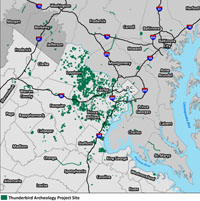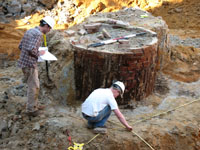| Thunderbird Archeology has enjoyed a notable presence in the Cultural Resource Management (CRM) field since 1981. The firm was acquired by WSSI in 2004, beginning a new phase in Thunderbird's three-decade history of providing expert CRM consultation in the private and public sectors. Thunderbird has undertaken over 1,500 projects in the region, including some of the largest developments in Northern Virginia.
|
| Cultural resource regulations are an often-overlooked but vital element of many permitting processes. Federal, state and local regulations often require archeological investigations to determine if cultural resources will be affected by a development or redevelopment project. Early identification of cultural resources on a property allows for the greatest possible flexibility in addressing the requirements of such regulations. Integrating cultural resource planning early in the permitting process can realize significant savings in time and planning resources. WSSI maintains a pro-active approach to the consultation process for all cultural resource services, initiating early coordination with Federal agencies or the State Historic Preservation Office (SHPO) as needed. |
 WSSI Archeology project map. Click on image to enlarge. WSSI Archeology project map. Click on image to enlarge.
|
|
WSSI provides a variety of services to assist our clients in locating, evaluating and addressing cultural resources, capitalizing upon WSSI's in-house expertise to streamline the permit and land development approval processes. Archeological services provided by WSSI include:
• Archeological Assessments (some call these Phase IAs)
• Phase I Investigations
• Phase II Evaluations
• Phase III Excavations
• Cemetery Delineations
• Historical Documentary and Archival Studies
• Section 106 Consultation and Agreement Document Preparation
• Agency Coordination
|
| WSSI archeologists can also assist during the feasibility process by identifying known cultural resources and assessing the probability that unrecorded cultural resources will be present using public databases, our GIS collection of historic maps dating back to 1624, our extensive private library and land form analysis. Becoming aware of potential problems early in the site development process increases the likelihood that significant resources can be avoided, thus saving time and money. |
 |
| WSSI archeologists investigating a 19th century well in Alexandria, VA |
|
| For additional information on WSSI's archeological services, please contact Kim Snyder. |